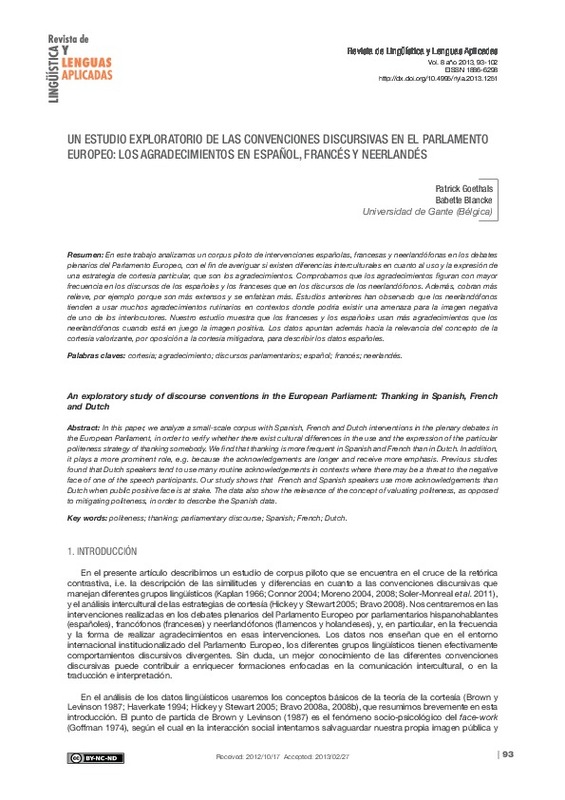Bravo, D. (2008a). "(Im)politeness in Spanish-speaking socio-cultural contexts: introduction", Pragmatics 18/4, 563-576.
Bravo, D. (2008b). "The implications of studying politeness in Spanish-speaking contexts: A discussion", Pragmatics 18/4, 577-603.
Brown, P. y Levinson, S. (1987). Politeness: Some Universals in Language Use. Cambridge: Cambridge University Press.
[+]
Bravo, D. (2008a). "(Im)politeness in Spanish-speaking socio-cultural contexts: introduction", Pragmatics 18/4, 563-576.
Bravo, D. (2008b). "The implications of studying politeness in Spanish-speaking contexts: A discussion", Pragmatics 18/4, 577-603.
Brown, P. y Levinson, S. (1987). Politeness: Some Universals in Language Use. Cambridge: Cambridge University Press.
Calzada Pérez, M. (1997). Transitivity in translating: the interdependence of texture and context. A contrastive study of original and translated speeches in English and Spanish from the European Parliament. Edinburgh: Heriot-Watt University.
Chilton, P. (1990). "Discourse, politics and diplomacy", Discourse & Society 1/2, 201-224. http://dx.doi.org/10.1177/0957926590001002005
Connor, U. (2004). "Intercultural rhetoric research: beyond texts", Journal of English for Academic Purposes 3, 291-304. http://dx.doi.org/10.1016/j.jeap.2004.07.003
De Landtsheer, C. (1998). "The political rhetoric of a unified Europe", en O. Feldman (ed.) Politically speaking: a worldwide examination of language used in the public sphere. Westsport: Praeger Publishers, 129-145.
Goffman, E. (1974). Frame Analysis. An Essay on the Organization of Experience. New York: Harper.
Haverkate, H. (1993). "Acerca de los actos de habla expresivos y comisivos en español", en H. Haverkate, K. Hengeveld, G. Mulder y S. Berniell (eds.) Aproximaciones pragmalingüísticas al español. Amsterdam: Rodopi, 149-180.
Haverkate, H. (1994). La cortesía verbal. Madrid: Gredos.
Hernández-Flores, N. (2008). "Politeness and other types of facework: Communicative and social meaning in a television panel discussion", Pragmatics 18/4, 681-706.
Hickey, L. (2005). "Politeness in Spain: Thanks but no 'Thanks'", en L. Hickey y M. Stewart (eds.) Politeness in Europe. Clevedon: Multilingual Matters, 317-330.
Hickey, L. y Stewart, M. (eds., 2005). Politeness in Europe. Clevedon: Multilingual Matters.
Kaplan, R. (1966). "Cultural thought patterns in intercultural education", Language Learning 16/1, 1-20. http://dx.doi.org/10.1111/j.1467-1770.1966.tb00804.x
Kerbrat-Orecchioni, C. (2004). "¿Es universal la cortesía?", en D. Bravo y A. Briz (eds.) Pragmática sociocultural: estudios sobre el discurso de cortesía en español. Madrid: Ariel, 39-54.
Kerbrat-Orecchioni, C. (2005). "Politeness in France: How to buy bread politely", en L. Hickey y M. Stewart (eds.) Politeness in Europe. Clevedon: Multilingual Matters, 29-44.
Laborda, X. (2002). "Ironía, sarcasmo y cortesía en el agradecimiento político", Oralia 5, 315-323.
Moreno, A. I. (2004). "Retrospective labelling in premise-conclusion metatext: an English-Spanish contrastive study of research articles on business and economics", Journal of English for Academic Purposes 3, 321-339. http://dx.doi.org/10.1016/j.jeap.2004.07.005
Moreno, A. I. (2008). "A study of critical attitude across English and Spanish academic book reviews", Journal of English for Academic Purposes 7/1, 15-26. http://dx.doi.org/10.1016/j.jeap.2008.02.009
Soler-Monreal, C., Carbonell-Olivares, M., y Gil-Salom, L. (2011). "A contrastive study of the rhetorical organisation of English and Spanish PhD thesis introductions", English for Specific Purposes 11/1, 4-17.
[-]








